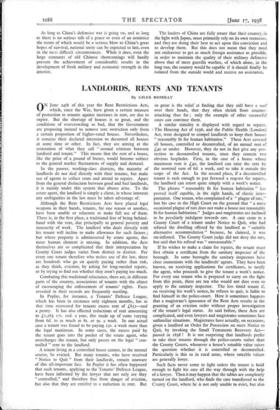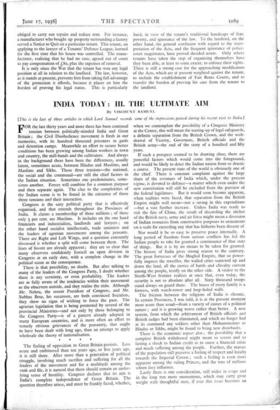LANDLORDS, RENTS AND TENANTS
By GILES ROMILLY
ON June 24th of this year the Rent Restrictions Acts, . which, since the War, have given a certain measure of protection to tenants against increases in rent, are due to expire. But the shortage of houses is so great, and the conditions of overcrowding so bad, that the Government are proposing instead to remove rent restriction only from a certain proportion of higher-rated houses. Nevertheless, it remains their declared intention to decontrol all houses at some time or other. In fact, they are aiming at the restoration of what they call " normal relations between landlord and tenant." This means that the rent of a house, like the price of a pound of butter, would become subject to the general market fluctuations of supply and demand.
In the poorer, working-class districts, the majority of landlords do not deal directly with their tenants, but make use of agents to collect rents and attend to repairs. Apart from the general distinction between good and bad landlords, it is mainly under this system that abuses arise. To the estate agent, the landlord is simply a client, in whose interests any ambiguities in the law must be taken advantage of.
Although the Rent Restrictions Acts have placed legal weapons in their hands, tenants, for one reason or another, have been unable or reluctant to make full use of them. There is, in the first place, a traditional fear of being behind- hand with the rent, due principally to general poverty and insecurity of work. The landlord who deals directly with his tenant will incline to make allowance for such factors ; but where property is administered by estate agents, this more human element is missing. In addition, the Acts themselves are so complicated that their interpretation by County Court judges varies from district to district. For every one tenant therefore who makes use of the law, there are hundreds who go on quietly paying rather than risk, as they think, eviction, by asking for long-needed repairs, or by trying to find out whether they aren't paying too much.
Combating this traditional reluctance, there are, in different parts of the country, associations of tenants with the object of encouraging the enforcement of tenants' rights. Facts revealed in their records are frequently startling.
In Poplar, for instance, a Tenants' Defence League, which has been in existence only eighteen months, has in that time recovered for tenants excess rent of £652—and a penny. It has also effected reductions of rent amounting to £1,263 17s. sod. a year, this made up of sums varying from 6d. to as much as 8s. or 9s. a week. In one actual case a tenant was found to be paying 15s. a week more than the legal maximum. In some cases, the excess paid by the tenant goes into the pocket of the estate agent, who overcharges the tenant, but only passes on the legal " con- trolled " rent to the landlord.
A tenant living in a controlled house cannot, in the normal course, be evicted. But many tenants, who have received " Notice to Quit " from their landlords, remain unaware of this all-important fact. In Poplar it has often happened that such tenants, applying to the Tenants' Defence League, have been informed by the lawyer that not only are they " controlled," and therefore free from danger of eviction, but also that they are entitled to a reduction in rent. But so great is the relief at finding that they still have a roof over their heads, that they often shrink from counter- attacking thus far ; only the example of other successful cases can convince them.
A similar timidity is displayed with regard to repairs.
• The Housing Act of 1936, and the Public Health (London) Act, were designed to compel landlords to keep their houses " reasonably fit for human habitation." These Acts covered all houses, controlled or decontrolled, of an annual rent of £40 or under. However, they do not in fact give any pro- tection to decontrolled tenants, since they contain two obvious loopholes. First, in the case of a house whose maximum rent is L40, the landlord can raise the rent by the nominal sum of 6d. a week, and so take it outside the scope of the Act. In the second place, if a decontrolled tenant is rash enough to put forward a request for repairs, the landlord can retort quite simply with a week's notice.
The phrase " reasonably fit for human habitation " has proved itself capable, in the right hands, of elastic inter- pretation. One tenant, who complained of a " plague of rats," lost his case in the High Court on the ground that " a mere occasional plague of rats does not make a house not reasonably fit for human habitation." Judges and magistrates are inclined to be peculiarly indulgent towards rats. A case came to a County Court of a tenant under Notice to Quit, who had refused the dwelling offered by the landlord as " suitable alternative accommodation " because, he claimed, it was rat-infested. The County Court judge did not deny the rats, but said that his refusal was " unreasonable."
If he wishes to make a claim for repairs, the tenant must first obtain a certificate from the sanitary inspector of the borough. In some boroughs the sanitary inspectors have close connexions with the landlords' agents. They have been known, on receiving applications for certificates, to notify the agent, who proceeds to give the tenant a week's notice. For every one tenant who is prepared to carry on the fight from this point, there are ten who would not dare even to apply to the sanitary inspector. The less timid tenant if, on receiving his week's notice, he refuses to quit, is liable to find himself in the police-court. Here it sometimes happens that a magistrate's ignorance of the Rent Acts results in the granting of an eviction order without proper investigation of the tenant's legal status. As said before, these Acts are complicated, and even lawyers and magistrates sometimes face unfamiliar situations. Magistrates have actually, on occasions, given a landlord an Order for Possession on mere Notice to Quit, by invoking the Small Tenements Recovery Act— passed in 1838 ! It is not surprising that landlords prefer to take their tenants through the police-courts rather than the County Courts, whenever a house's rateable value raises the question whether it is controlled or decontrolled. Particularly is this so in rural areas, where rateable values are generally lower.
Such facts never come to light unless the tenant is bold enough to fight his case all the way through with the help of a lawyer. Then it may happen that the tables are completely turned on the landlord, who finds the case transferred to the County Court, where he is not only unable to evict, but also obliged to carry out repairs and reduce rent. For instance, a manufacturer who bought up property surrounding a factory served a Notice to Quit on a particular tenant. This tenant, on applying to the lawyer of a Tenants' Defence League, learned for the first time that his house was controlled. The manu- facturer, realising that he had no case, agreed out of court to pay compensation of £8o, plus the expenses of removal.
It is only since the War that the tenant has won any legal position at all in relation to the landlord. The law, however, as it stands at present, prevents him from taking full advantage of the protection it affords, because it places on him the burden of proving his legal status. This is particularly hard, in view of the tenant's traditional handicaps of fear, poverty, and ignorance of the law. To the landlord, on the other hand, the general confusion with regard to the inter- pretation of the Acts, and the frequent ignorance of police- court magistrates, have proved decided assets. Only where tenants have taken the step of organising themselves have they been able, at least to some extent, to enforce their rights. There is still a strong case for the approaching modification of the Acts, which are at present weighted against the tenant, to include the establishment of Fair Rents Courts, and to transfer the burden of proving his case from the tenant to the landlord.



















































 Previous page
Previous page